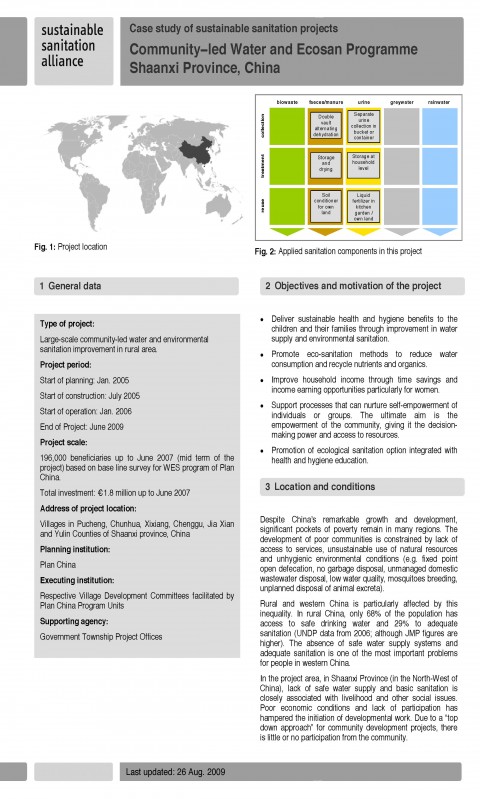Community-led Water and Ecosan Programme Shaanxi Province, China - Case study of sustainable sanitation projects
Kumar, P. (2009)

Published in: 2009
Publisher:
Sustainable Sanitation Alliance (SuSanA)
Author:
Kumar, P.
Uploaded by:
SuSanA secretariat
Partner profile:
common upload
11764 Views
227 Downloads
Location of library entry
This case study is about a large-scale community-led water and environmental sanitation project in the rural area of Shaanxi Province, China. Up to June 2007 the project serves approximately 196,000 beneficiaries and has a total investment of € 1.8 million.
Objectives of the project are delivery of sustainable health and hygiene benefits to children and their families through improvement in water supply and environmental sanitation as well as the empowerment of the community (decision making power and access to resources). There should be a promotion of eco-sanitation methods to reduce water consumption and recycle nutrients and organics in addition. Another aim is to improve household income through time savings and income earning opportunities particularly for women.
In rural China, only 68% of the population has access to safe drinking water and 29% to adequate sanitation. A lot of inhabitants of China’s under-developed regions such as Shaanxi province lack safe drinking water, which forces families to use contaminated water sources that expose them to a range of water borne pathogens. In addition, there is a lack of knowledge about the relationship between hygiene, water quality and good health. The lack of access to basic sanitation increases the contamination of local water sources, degrades the local environment and promotes the spread of disease. It is an old practice in China to use human excreta as fertilizer for crops and vegetables. Therefore, the project area is most suitable for the promotion of ecological sanitation (in the form of urine-diversion dehydration toilets).
The first urine diverting toilets of the project were piloted and demonstrated in Sanyong village in Pucheng County during May/June 2005. After the successful pilot of urine diverting toilets in all counties, the construction of these systems grew and the high number in 2066 proved a good acceptance by the people. Three types of latrines have been presented to the community to choose from in the programme area:
a) Urine diverting dehydration toilets (65% of the constructed systems)
b) Biogas toilets
c) Twin pit series latrines (double urn toilets)
By promotion of ecosan systems the hygienic concerns are being addressed, and excreta can be safely utilized for crop fertilization. Mid-term evaluation of the programme was carried out in September 2007. The evaluation showed the improved usage of toilets. Demonstration and cross visits are important tools for community capacity building. Urine diverting toilets proved to be a community-friendly technology in rural China.However, more community mobilization activities should be planned.
Community mobilization and gender awareness is a continuous process and cannot be achieved by a single training period.
Bibliographic information
Kumar, P. (2009). Community-led Water and Ecosan Programme Shaanxi Province, China - Case study of sustainable sanitation projects. Sustainable Sanitation Alliance (SuSanA)
Filter tags
Biogas systems Case studies in SuSanA template East Asia & Pacific English Faeces or faecal sludge Rural Urine Urine diversion dehydration toilets (UDDTs)














